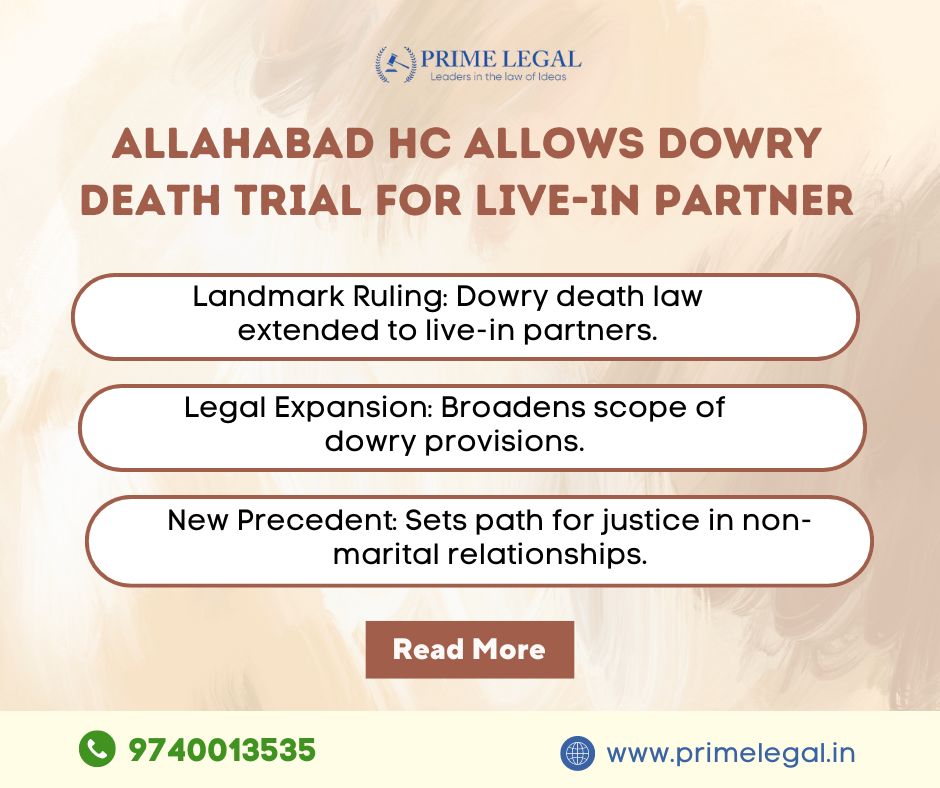INTRODUCTION
In this case, the Allahabad High Court, had declined to quash charges of cruelty and dowry death filed against the accused, who claimed to be merely a live-in partner of the deceased woman and not a spouse. While earlier, the trial court had rejected the application that was moved by the accused Adarsh Yadav, for discharge in the case under §498A and §304B of the Indian Penal Code, 1860, it was subsequently appealed before the High Court of Allahabad.
BACKGROUND
Herein, in the case of Adarsh Yadav v. State of UP and Anr. the Allahabad High Court had recently refused to quash the charges of cruelty and dowry death filed against a man, who had claimed to be only a live-in partner of a woman, who had passed away by suicide. This case was led by a Single Judge Bench, comprising of Hon’ble Justice Raj Beer Singh, and the Applicant in the present case was Adarsh Yadav.
KEY ASPECTS
In this case, Justice Raj Beer Singh had stated that, even if it was assumed that the victim did not fall within the category of being a legally wedded wife, there is ample evidence present on record, to show that the accused and the victim were residing together, as husband and wife, at the particular point of time. The order stated that, “In the instant case, for the sake of arguments even if it is assumed that the deceased does not fall within the ambit of legally wedded wife, there is ample evidence on record that applicant and deceased were residing together as husband and wife at the relevant point of time”.
While the accused challenged the charges made against the accused, due to which he was rejected from moving an application for the same, stating that the victim had earlier married another man, and there is no credible evidence to show that the woman divorced this man, and that he resided with the victim in a live-in relationship and not in a marriage, the State said that, the complaint clearly mentioned that after the victim’s first marriage, she was divorced by her first husband and that she had married the applicant thereafter.
Moreover, the State also added that, there were allegations there existed dowry harassment towards the woman, prompting her suicide at the premises of the accused. It also told that, the question on whether the marriage between the deceased woman and the applicant was lawful or not, is a question of fact, and can be found only in the course of trial process.
In addition, the following points were also noted by the High Court:
- The Court considered the judicial precedents set by the Supreme Court, including the case of Reema Aggarwal v. Anupam & Ors., decided in the year 2004. Herein, it was held that, “The absence of a definition of ‘husband’ to specifically include such persons who contract marriages ostensibly and cohabitate with such woman, in the purported exercise of his role and status as ‘husband’ is no ground to exclude them from the purview of Section 304B or 498A, IPC.”
- Furthermore, Hon’ble Justice Raj Beer Singh also referred to a case ruled by the Chhattisgarh High Court, that held that, “it is sufficient to show that an accused and a victim were “residing as husband and wife” to attract charges under Sections 498A (cruelty to married woman) and 304B (dowry death) of the Indian Penal Code”.
- The aforementioned holding was made in the case of Mohitram v. State of Chhatisgarh, wherein, it was quoted that, “the intention of legislature behind inserting the provisions of Section – 304-B I.P.C. was that husband and his relatives, who are responsible for the dowry death of a woman should be brought into mischief of dowry death whether the marriage in question was valid or not. It was observed that in order to attract provisions of Section – 304-B and 498-A of I.P.C., it is sufficient to show that victim woman and accused husband were residing as husband and wife at the relevant point of time”.
CONCLUSION
Taking into consideration the arguments made by both the Parties, the Court noted that, there was a clear averment made in the First Information Report that the marriage of victim and accused had “taken place through court.” It further said that, even if such position is disputed, the charges against the accused cannot be quashed under §482 of CrPC. Therefore, the Court upheld the order of the trial court, and allowed the same to continue.
“PRIME LEGAL is a full-service law firm that has won a National Award and has more than 20 years of experience in an array of sectors and practice areas. Prime legal fall into a category of best law firm, best lawyer, best family lawyer, best divorce lawyer, best divorce law firm, best criminal lawyer, best criminal law firm, best consumer lawyer, best civil lawyer.”
Written by – Thanuja Anthiyur Aravindan


